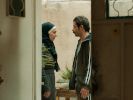Eye For Film >> Movies >> Inshallah A Boy (2023) Film Review
Inshallah A Boy
Reviewed by: Amber Wilkinson

The injustices of Jordanian’s patriarchal power system are laid bare through this story of a widow, Nawal (Mouna Hawa), and her young daughter Nora (Seleena Rababah). Although this is the first film from Jordan to feature in Cannes, it is the latest of many films from the region - including the likes of The Perfect Candidate, The Salesman and Beauty And The Dogs - to highlight gender inequalities through social drama.
Nawal and her husband Ahmad (Mohammad Al Jizawi) are trying for a second child when disaster strikes and one morning he simply doesn’t wake up. Although everyone initially seems to be sympathetic, it’s not long before cracks begin to show in the concerned facade of Ahmad’s brother Rifqi (Haitham Omari), as he starts to badger Nawal for instalments he was owed by Ahmad for his pickup truck.

This is the thin end of the wedge of Nawal’s problems, as Rifqi is also keen to split Ahmad’s inheritance, which because she has no son, could see her lose both her house and custody of her daughter, even though she paid her share to buy it. Director Amjad Al Rasheed - who collaborated on the script with Rula Nasser and Delphine Agut - shows strong control of the mood in his first film as Nawal finds she can’t catch a break at work either. Although the family whose Alzheimier’s-hit matriarch Nawal cares for are from a higher social class, the woman’s granddaughter Lauren (Lumna Marwan) - who unlike Nawal doesn’t wear a hijab - is also grappling with marriage issues after finding herself pregnant to her unfaithful husband.
Without resorting to melodramatics, Al Rasheed lets the tension drip, as Nawal makes a daring decision which leads to an increasingly defiant stand against her brother-in-law. It’s a move that sees her and Lauren become united in their opposing predicaments.
A sort of soft-faced tyrany abounds - from the manipulations Rifqi uses in a bid to get Nawal to agree to everything, to the acquiescent response of her brother, who though broadly sympathetic is unwilling to fight her corner. There is a measured approach to relationships, however, with a subplot involving Nawal’s co-worker Hassan (Eslam Al-Awadi) highlighting a potential outlet of sympathy while also reinforcing the barriers towards asking for it.
The two main themes of this film are conditioning and a growing refusal to be cowed. The first is underscored by the way Nawal’s neighbour gets little Nora to pretend she is a superhero while wearing the hijab - a move pointedly echoed elsewhere in the film when Lauren’s mother angrily declares she “thinks she’s superwoman”. A mouse in Nawal’s kitchen, meanwhile, acts as a metaphor for the latter. At first she is scared of it, despite her daughter leading her to confess she wasn’t frightened of them as a child. Later, Nawal’s attitude to her tiny interloper also starts to harden, as it does towards everything else.
A moment of almost supernatural intensity at night doesn’t quite sit evenly with the rest of the film, but it’s nice to see a debut director willing to take a chance on something. For the most part, Al Rasheed employs his metaphors skillfully by making sure the plot remains convincingly character-driven. A question hangs in the air about whether things will be different for Nora, Al Rasheed makes the case that with the solidarity and strength of Nawal’s generation, they will.
Reviewed on: 19 May 2023















